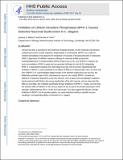| dc.contributor.author | Meisel, Joshua Daniel | |
| dc.contributor.author | Kim, Dennis H. | |
| dc.date.accessioned | 2018-06-26T18:50:40Z | |
| dc.date.available | 2018-06-26T18:50:40Z | |
| dc.date.issued | 2016-07 | |
| dc.date.submitted | 2016-05 | |
| dc.identifier.issn | 0960-9822 | |
| dc.identifier.issn | 1879-0445 | |
| dc.identifier.uri | http://hdl.handle.net/1721.1/116649 | |
| dc.description.abstract | Lithium has been a mainstay for the treatment of bipolar disorder, yet the molecular mechanisms underlying its action remain enigmatic. Bisphosphate 3′-nucleotidase (BPNT-1) is a lithium-sensitive phosphatase that catalyzes the breakdown of cytosolic 3′-phosphoadenosine 5′-phosphate (PAP), a byproduct of sulfation reactions utilizing the universal sulfate group donor 3′-phosphoadenosine 5′-phosphosulfate (PAPS) [1–3]. Loss of BPNT-1 leads to the toxic accumulation of PAP in yeast and non-neuronal cell types in mice [4, 5]. Intriguingly, BPNT-1 is expressed throughout the mammalian brain [4], and it has been hypothesized that inhibition of BPNT-1 could contribute to the effects of lithium on behavior [5]. Here, we show that loss of BPNT-1 in Caenorhabditis elegans results in the selective dysfunction of two neurons, the bilaterally symmetric pair of ASJ chemosensory neurons. As a result, BPNT-1 mutants are defective in behaviors dependent on the ASJ neurons, such as dauer exit and pathogen avoidance. Acute treatment with lithium also causes dysfunction of the ASJ neurons, and we show that this effect is reversible and mediated specifically through inhibition of BPNT-1. Finally, we show that the selective effect of lithium on the nervous system is due in part to the limited expression of the cytosolic sulfotransferase SSU-1 in the ASJ neuron pair. Our data suggest that lithium, through inhibition of BPNT-1 in the nervous system, can cause selective toxicity to specific neurons, resulting in corresponding effects on behavior of C. elegans. | en_US |
| dc.description.sponsorship | National Institutes of Health (U.S.) (Grant GM084477) | en_US |
| dc.publisher | Elsevier | en_US |
| dc.relation.isversionof | http://dx.doi.org/10.1016/J.CUB.2016.05.050 | en_US |
| dc.rights | Creative Commons Attribution-NonCommercial-NoDerivs License | en_US |
| dc.rights.uri | http://creativecommons.org/licenses/by-nc-nd/4.0/ | en_US |
| dc.source | PMC | en_US |
| dc.title | Inhibition of Lithium-Sensitive Phosphatase BPNT-1 Causes Selective Neuronal Dysfunction in C. elegans | en_US |
| dc.type | Article | en_US |
| dc.identifier.citation | Meisel, Joshua D., and Dennis H. Kim. “Inhibition of Lithium-Sensitive Phosphatase BPNT-1 Causes Selective Neuronal Dysfunction in C. Elegans.” Current Biology 26, 14 (July 2016): 1922–1928 © 2016 Elsevier Ltd | en_US |
| dc.contributor.department | Massachusetts Institute of Technology. Department of Biology | en_US |
| dc.contributor.mitauthor | Meisel, Joshua Daniel | |
| dc.contributor.mitauthor | Kim, Dennis H. | |
| dc.relation.journal | Current Biology | en_US |
| dc.eprint.version | Author's final manuscript | en_US |
| dc.type.uri | http://purl.org/eprint/type/JournalArticle | en_US |
| eprint.status | http://purl.org/eprint/status/PeerReviewed | en_US |
| dc.date.updated | 2018-06-26T18:40:40Z | |
| dspace.orderedauthors | Meisel, Joshua D.; Kim, Dennis H. | en_US |
| dspace.embargo.terms | N | en_US |
| dc.identifier.orcid | https://orcid.org/0000-0002-6944-5177 | |
| dc.identifier.orcid | https://orcid.org/0000-0002-4109-5152 | |
| dspace.mitauthor.error | true | |
| mit.license | PUBLISHER_CC | en_US |
